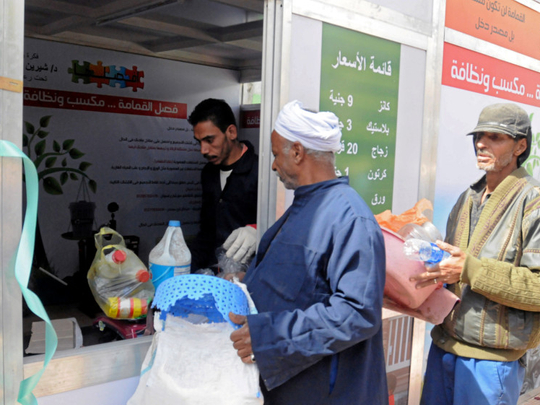
Cairo: Egyptians stood in line on Wednesday outside a waste management station in the capital Cairo to sell their solid trash, a baby step in an ambitious project to ease the gigantic waste management problems afflicting this city of some 18 million.
Those in the queue outside the station — a large and colourful kiosk standing on a sidewalk in Cairo’s leafy suburb of Heliopolis — carried bags of old schoolbooks, plastic water bottles and other recyclable material. They placed them on scales standing near a price list for types of material and later received their cash.
The station, one of two in Cairo, was already filled with bags of recyclables brought in since its inauguration over the weekend. “Garbage will not be a problem, but rather a source of income,” declares the writing on the station’s outer wall. “Separating garbage brings profit and cleanliness,” reads another.
“There used to be a big pile of garbage where the station now stands, and it smelled horrible,” 46-year-old Laila Al Shazly said with relief while standing in line to sell empty bottles.
Cairo’s waste is currently managed by its local government as well as informal trash collectors who go door-to-door collecting garbage and later picking out recyclable material on the outskirts of the city. A total of nearly five million tonnes of garbage were collected in the greater Cairo area in 2014, according to the latest figures issued by the state statistics bureau.
By offering additional income at a time when most Egyptians are struggling to make ends meet amid an economic crisis, the initiative created an incentive for Cairo residents to get into recycling, a practice that is mostly neglected in the capital and elsewhere in Egypt.
The initiative was first proposed by two lawmakers and later embraced by Cairo’s local government, which issued permits and leased land free of charge to private investors running the solid waste stations.
One such investor, Nariman Talaat, told AP that Egyptians were showing interest in the project, but cautioned that it would take time before they learn how to properly separate their waste.
“I think that unused garbage is wasted money, that’s why I liked the idea,” she said.
Nadia Henry, one of the two lawmakers behind the initiative, told AP the project was part of a long-term plan to create a comprehensive, environment-friendly waste management system in the country of some 92 million people.
Cairo’s governor, Atef Abdul Hamid, has ordered the expansion of the project to cover all of Cairo, a prelude to its implementation nationwide, according to Henry.












